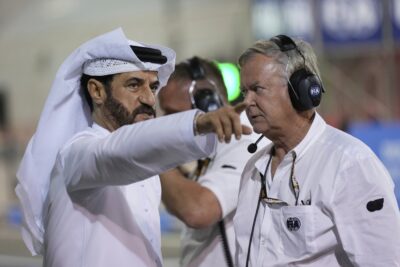Is the punishment for cursing in F1 too harsh? Racing boss hints at changes after driver backlash
By Canadian Press on April 29, 2025.

A standoff over cursing in Formula 1 could be one step closer to a solution.
Ahead of this week’s Miami Grand Prix, the president of Formula 1’s governing body, the FIA, has signaled he’ll make “improvements” to punishments for swearing and criticism which have sparked a backlash from F1 drivers.
FIA President Mohammed Ben Sulayem posted on Instagram Monday that after “constructive feedback” from drivers across the various event the FIA governs, “I am considering making improvements to Appendix B.”
That’s the document which lays out the punishments for a range of offenses ranging from physical violence to political statements, using foul language and any comments deemed to cause “moral injury or loss” to FIA. The base fine for an F1 driver is set out at 40,000 euros ($45,500).
Cursing behind the wheel
It’s not clear that cursing is more common in F1 than other sports. With radio broadcasts from the cars and camera crews throughout the paddock, drivers are under more surveillance than almost any other athletes.
“In other sports you don’t run around with a mic attached to you,” Verstappen said last year. “I think a lot of people say a lot of bad things when they are full of adrenaline in other sports. It just doesn’t get picked up.”
Various drivers have also called for a lenient approach to swearing out of frustration over the radio during a race, if a non-English speaker uses a word without being sure of its meaning, or if drivers use an expletive to describe themselves or their own car, not other people.
Verstappen’s suggested it should be a problem for broadcasters, not drivers. The four-time champion said last year that TV includes drivers swearing “probably also for entertainment purposes,” adding: “I think it already just starts with not broadcasting it.”
Drivers are frustrated
Ben Sulayem has been seeking to crack down on cursing since last year and punishments were tightened for 2025 to allow for larger fines and suspensions for drivers who swear repeatedly.
From the start, his efforts have attracted controversy.
“We have to differentiate between our sport — motorsport — and rap music,” Ben Sulayem said when he announced his plans last year in an interview with motorsport.com. “We’re not rappers, you know.”
Seven-time champion Lewis Hamilton, who is Black, said there was a “racial element” to Ben Sulayem’s comments.
The crackdown on swearing prompted a backlash from F1 drivers when Max Verstappen and Charles Leclerc were punished last year. Leclerc was fined and Verstappen was asked to make amends with community service for describing his car with an expletive. Drivers in the World Rally Championship boycotted TV interviews last month after one of them was fined.
It’s not just about profanity. After the last F1 race in Saudi Arabia, Verstappen refused to talk about a penalty which cost him the lead because, he suggested, any criticism risked breaking the FIA rules.
“I know that I cannot swear in here but at the same time, you can also not be critical,” he said.
How do other sports deal with cursing?
Approaches differ across sports and generally take the circumstances into account. Athletes who curse at a referee or a fan generally get harsher punishments.
When he was sent off for explicit language while protesting a referee’s call in February, Real Madrid midfielder Jude Bellingham sparked a debate on where soccer should set the limits of what’s acceptable.
“Bellingham didn’t do anything that deserved a sending off,” his coach Carlo Ancelotti said. “He said ‘(expletive) off,’ not ’(expletive) you.’ I don’t think that was meant to be offensive.”
“Audible obscenity” rules in tennis are one example where an athlete could be fined for using an expletive about themselves or their game — similar to some of the incidents F1 drivers have been concerned about.
Golf star Tyrrell Hatton was fined in November for cursing loudly and snapping a club in a frustrating moment on the European tour.
In the NBA, Minnesota Timberwolves star Antony Edwards got a $100,000 fine in December for profanities in a TV interview. The league said the fine was larger because of Edwards’ history of similar incidents. He was also fined $50,000 last week for using inappropriate language and an obscene gesture toward a spectator.
What could happen next?
Much will depend on the substance of any changes Ben Sulayem introduces. So far, it seems he’s focusing on how punishments work, not changing the rules themselves.
There has already been one sign of a more flexible approach when Carlos Sainz, Jr. wasn’t fined for using an expletive in a news conference while he protested another fine for being late for a national anthem.
Ben Sulayem’s four years in office have been marked by repeated confrontations with drivers and senior officials. A change of course on cursing could mean less tension ahead of potential re-election later this year.
“Humans make the rules and humans can improve the rules,” Ben Sulayem wrote Monday. “The principle of continuous improvement is something I have always believed in and is at the heart of all we do at the FIA.”
___
AP auto racing: https://apnews.com/hub/auto-racing
James Ellingworth, The Associated Press
-34


